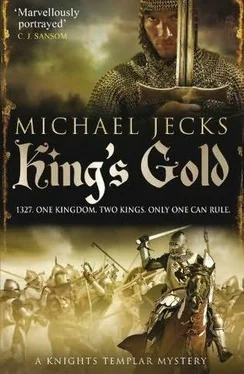Michael Jecks - King's Gold
Здесь есть возможность читать онлайн «Michael Jecks - King's Gold» весь текст электронной книги совершенно бесплатно (целиком полную версию без сокращений). В некоторых случаях можно слушать аудио, скачать через торрент в формате fb2 и присутствует краткое содержание. Год выпуска: 2011, ISBN: 2011, Издательство: Simon & Schuster UK, Жанр: Исторический детектив, на английском языке. Описание произведения, (предисловие) а так же отзывы посетителей доступны на портале библиотеки ЛибКат.
- Название:King's Gold
- Автор:
- Издательство:Simon & Schuster UK
- Жанр:
- Год:2011
- ISBN:9781847379030
- Рейтинг книги:4 / 5. Голосов: 1
-
Избранное:Добавить в избранное
- Отзывы:
-
Ваша оценка:
- 80
- 1
- 2
- 3
- 4
- 5
King's Gold: краткое содержание, описание и аннотация
Предлагаем к чтению аннотацию, описание, краткое содержание или предисловие (зависит от того, что написал сам автор книги «King's Gold»). Если вы не нашли необходимую информацию о книге — напишите в комментариях, мы постараемся отыскать её.
King's Gold — читать онлайн бесплатно полную книгу (весь текст) целиком
Ниже представлен текст книги, разбитый по страницам. Система сохранения места последней прочитанной страницы, позволяет с удобством читать онлайн бесплатно книгу «King's Gold», без необходимости каждый раз заново искать на чём Вы остановились. Поставьте закладку, и сможете в любой момент перейти на страницу, на которой закончили чтение.
Интервал:
Закладка:
The party was making its way north around the wild lands, and soon would turn north and east towards York. That was where the King’s Host was gathering. From what Baldwin had heard, it was clear the young King was determined to crush the Scottish. Their raids and depredations upon the innocent farmers and peasants of the north had appalled him, and he had set his heart on destroying them once and for all. He was calling upon all: Hainaulters, Frenchmen, barons, knights and squires, to join him in this great endeavour. Many had already been summoned to meet the King at York for the Monday following Rogation Sunday 55and it was thought that they would soon thereafter march on Scotland.
But to reach York would take time. All he could think of as he rode was his manor, his wife and his children. He was riding ever further from them with every passing hour. It felt as though he was being torn in two: his heart was with his family, while his head demanded that he carry on to York and to battle as a warrior. Baldwin had a duty to fight for the greater good.
They were in a broad plain when he saw a small contingent of men-at-arms veering off to the left. There were seven all told, and Baldwin frowned at the sight. There were all too many men who would ‘ride out’, foraging amongst peasants’ houses for tidbits of food or drink. It was natural that a knight would expect those whom he protected to reward him for his efforts, but some took advantage of their position and would steal and harry without mercy. Baldwin had seen it in the Holy Land, in Italy, and in France, and recently he had witnessed it in England.
On a whim, he clucked his tongue and spurred his horse. Leading Edgar and John, he rode at a moderate canter towards the men. But he had misjudged them. They were not riding out; they had simply spotted a party of men trying to hide, and had encircled them with lances at the ready.
‘What is this?’ Baldwin demanded as he approached. There were eleven all told, and well-dressed in soft wools and linens. The leader was a little younger than Baldwin. He had dark hair and hazel eyes in a sunburned face that was square and as uncompromising as granite. As he eyed the men encircling him, his attention was more with the rest of the column than the men about him, Baldwin noticed.
‘You!’ he said to the man. ‘What is your name?’
‘David of Monteith. Who are you?’
‘Sir Baldwin de Furnshill,’ Baldwin said. ‘You are many leagues from home, friend.’
‘We travel south. To family in Wales.’
‘Aye?’ Baldwin eyed the men’s clothing. They had all travelled in foul weather, from the look of the mud that had splattered about their boots and up their horses’ legs. They were particularly well armed, too, but that was no surprise — travellers needed the means of protecting themselves. ‘You have met with inclement weather.’
‘What of it?’
‘Not many would carry on in the worst of weathers. They would rest themselves and their horses in an inn. You must have great need to ride so far so fast. What is the cause?’
‘We have no great urgency,’ the man insisted. His companions murmured and their sturdy horses moved uneasily.
Edgar was at his side, and Baldwin knew that there was no need to trouble himself on that flank. Nobody would pass Edgar unless they killed him first, and that would require a more resolute man than most Baldwin had met.
‘John, ride to my Lord Berkeley and tell him there are Scottish forces riding to spy on us,’ Baldwin said calmly.
There was a moment’s silence after his words. Baldwin was filled with a heightened awareness — of the men around him, but more, of the sound of bees among the flowers and grasses at his feet, the song of larks high overhead, the wind soughing through the branches of the furze.
And then Monteith dragged his sword free and bellowed his war-cry, spurring his beast at Baldwin.
Baldwin grabbed at his sword but it seemed to take a dreadful amount of time to clear it from the scabbard. Too slow: he must be run through by Monteith’s sword, and then his new blade was out and flashing wickedly in the pale daylight. A gleam caught it, and it sparked in blue fire.
He was about to ride on to meet Monteith when Edgar flew past him, and Baldwin saw another man with a bow aiming it at him. He readied himself for the arrow, fully expecting to feel it in his breast at any moment, but before Edgar could reach the archer, Monteith was at his side, and had raised his sword. Baldwin lifted his own and parried, and as he was about to turn his steel to attack, Monteith coughed and groaned, and tumbled from his horse, the arrow planted in the back of his neck at the base of his skull.
Berkeley Castle
Simon and Sir Richard de Welles were pleased to hear the sound of horses approaching. The confinement in the castle was an intense irritation to all concerned. However, it was natural that the people of the household should remain together when a murder was discovered, so that the malefactor was prevented from running away. A killer abroad was a danger to all, because if a man would kill once, clearly he was likely to do so again. It was a basic premise of the law that a murderer should be punished by the loss of his life. Otherwise what was the point of laws? Such a man was a threat to the whole order of society. That was Simon’s belief.
The law itself was, as he knew, more pragmatic. It required that the body remain where it was when it was discovered; this also applied to the people who had been near when the man was killed, so that their names could be registered. Then, when a Justice arrived on his tourn, the correct fines could be imposed on each of them.
‘Sounds like him now,’ Sir Richard said, standing up. The maid, who had been sitting on his lap, squeaked as he unceremoniously dumped her on the ground. ‘Sorry, wench. Coroner’s comin’ and I need to have a word or two with him.’
Simon helped the girl to her feet before hurrying after Sir Richard.
He found the knight at the gateway, speaking with a slender, short man with grizzled hair and a thin, oval face. From his size and fine features, he looked more like a clerk than a coroner and knight, especially in comparison with the man behind him who travelled on a donkey. He was a clerk, from his tonsure and habit, but he had the build of a wrestler, and his black eyes were suspicious.
‘Sir Ranulf, I am well indeed. And you?’
‘My health has not been good of late,’ the coroner said, and sprang lightly from his horse. ‘I am plagued by afflictions that will, I have no doubt, carry me off before long. I must make the most of the time God has seen fit to give to me. It is not easy when you are prey to so many ailments.’
‘It must be a torment,’ Sir Richard said seriously.
‘It is. Where is the body?’
‘Come, take a little wine or ale first. You have had a long, wearisome journey, I make no doubt.’
‘It has been wearisome, yes,’ the coroner said. ‘But a man must accept the trials imposed upon him.’
‘So, food and drink first?’ Sir Richard said hopefully.
‘Sir Ranulf, if you refuse him, there could be another murder in this castle,’ the clerk said.
‘Master Rodney, kindly remember that I am the coroner, you are the clerk. I speak, you record. That is the basis of our collaboration. You recall?’
‘Oh, yes. I recall. But, Sir Knight, if you want me to record for you, you will do very badly unless I have eaten first. My reeds will all break and smudge the pages, unless your amiable, obedient servant is fed.’
‘In God’s name, what a trial this fellow is. I swear,’ Coroner Ranulf said. He eyed the clerk with a stern look. ‘Come, man, have you no sense of duty?’
Читать дальшеИнтервал:
Закладка:
Похожие книги на «King's Gold»
Представляем Вашему вниманию похожие книги на «King's Gold» списком для выбора. Мы отобрали схожую по названию и смыслу литературу в надежде предоставить читателям больше вариантов отыскать новые, интересные, ещё непрочитанные произведения.
Обсуждение, отзывы о книге «King's Gold» и просто собственные мнения читателей. Оставьте ваши комментарии, напишите, что Вы думаете о произведении, его смысле или главных героях. Укажите что конкретно понравилось, а что нет, и почему Вы так считаете.












